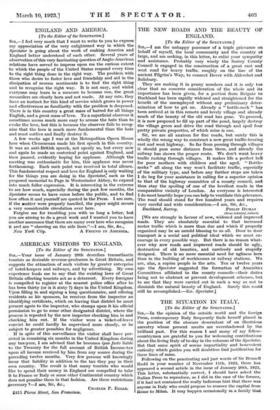ENGLAND AND AMERICA.
[To the Editor of the SPECTATOR.] feel very much that I want to write to you to express 'my appreciation of the very enlightened way in which the Spectator is going about the work of making America and England better understood of each other. Several years of observation of this very fascinating question of Anglo-American relations have served to impress upon me the curious extent to which the people of the United States respond every time to the right thing done in the right way. The problem with .those who desire to foster love and friendship and aid in the dissipation of reverse sentiments is to find the right thing and to recognize the right way. It is not easy, and whilst everyone may learn in a measure to become one, the great reconcilers are clearly born and not made. At any rate, they; have an instinct for this kind of service which grows in power and effectiveness as familiarity with the problem is deepened. There is in this country a great mass of hatred for all things English, and a great mass of love. To a superficial observer it sometimes seems much more easy to arouse the hate than to evoke the love, but this is because the observer fails to recog- nize that the love is much more fundamental than the hate and must outlive and finally destroy it.
A few weeks ago I was at the Metropolitan Opera House here when Clemenceau made his first speech in this country. It was an anti-British speech, not openly so, but every now and again he made an oratorical point against England, and then paused, evidently hoping for applause. Although the meeting was enthusiastic for him, this applause was never forthcoming. Each such point waS received in total silence. This fundamental respect and love _for England is only waiting for the things you are doing in the Spectator,. such as the proposed memorial to Page in Westminster Abbey, to expand into much fuller expression. It is interesting in the extreme to see how much, especially during the past few months, the Spectator -seems to have come before the public, and to find how often it and yourself are quoted in the Press. I am sure, if the matter were properly handled, the paper might secure a very considerable circulation over here.
Forgive me for troubling you with so long a letter, but you are aiming to do a great work and I wanted you to have another assurance that there are many over here who recognize it and are "cheering on the side lines."—I am, Sir, &e.,










































 Previous page
Previous page